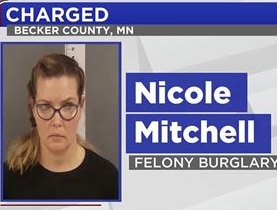According to court filings, Thompsons attorney is demanding the following information:
Trial Witnesses; Other Persons; Grand Jury Witnesses. Defendant demands disclosure of all the following, within the scope of the prosecutor’s responsibility as defined by Rule 9.01, subdivision 1a of the Minnesota Rules of Criminal Procedure.
(a) Trial Witnesses. Disclose the names and addresses of witnesses who may be called by the prosecutor at trial, along with their record of convictions, if any.
(b) Other Persons. Disclose the names and addresses of anyone else with information relating to the case.
(c) Grand Jury Witnesses. If the defendant has been charged by indictment, disclose the names and addresses of the grand jury witnesses.
(2) Statements. Defendant demands disclosure of witness statements.
Disclose all the following, within the prosecutor’s scope of responsibility as defined by Rule 9.01, subdivision 1a, of the Minnesota Rules of Criminal Procedure, that relate to the case:
(a) written or recorded statements;
(b) written summaries of oral statements;
(c) the substance of oral statements.
(3) Documents and Tangible Objects. Defendant demands disclosure of all of the following within the scope of the prosecutor’s responsibility as defined by Rule 9.01, subdivision 1a, of the Minnesota Rules of Criminal Procedure.
Disclose all of the following that relate to the case:
(a) books, papers, documents;
(b) photographs;
(c) law enforcement officer reports;
(d) tangible objects;
(e) the location of buildings and places;
(f) grand jury transcripts;
(g) reports on prospective jurors.
(4) Reports of Examinations and Tests. Defendant demands disclosure of all of the following within the scope of the prosecutor’s responsibility as defined by Rule 9.01 Subdivision 1a of the Minnesota Rules of Criminal Procedure:
(a) The results or reports of physical or mental examinations, scientific tests, experiments, or comparisons made that relate to the case.
(b) In addition, the prosecutor must allow the defendant to conduct reasonable tests. If a test or experiment might preclude any further tests or experiments, the prosecutor must give reasonable notice and opportunity to the defense so that a qualified expert may observe the test or experiment.
(c) A person who will testify as an expert but who created no results or reports in connection with the case must provide to the prosecutor for disclosure to the defense a written summary of the subject matter of the expert’s testimony, along with any findings, opinions, or conclusions the expert will give, the basis for them, and the expert’s qualifications.
(5) Criminal Records of Defendant and Defense Witnesses.
Disclosure of conviction records of the defendant and if any defense witnesses that are known to the prosecutors, provided that the defense informs the prosecutor of any of these records known to the defendant.
(6) Exculpatory information.
Disclose ALL Material or information in the prosecutor’s possession and control that tends to negate or reduce the defendant’s guilt.
(7) Evidence Relating to Aggravated Sentence.
Disclose ALL Evidence the prosecutor may rely on in seeking an aggravated sentence.
II. PROSECUTOR’S SCOPE OF OBLIGATION
Defendant specifically demands that the prosecutor disclose material within the prosecutor’s scope of obligation as defined by Rule 9.01, Subdivision la, of the Minnesota Rules of Criminal procedure.
Defendant specifically demands that the prosecutor disclose all material within the scope of the prosecutor’s obligation as defined by the Constitution of the State of Minnesota and of the United States of American, and the cases interpreting that obligation.
The defendant specifically demands that the prosecutor disclose the substance of any statement that relates to this case even if:
A. The prosecutor or others failed to make a contemporaneous recording of the statement. State v. Kaiser, 486 N.W.2d 384 (Minn. 1992). (A prosecutor must disclose the substance of a statement even if they do not take notes).
B. The prosecutor or others have the objective belief that a statement is not new, novel, or interesting. State v. Miller, 754 N.W.2d 686, 705 (Minn. 2008). (A prosecutor must disclose the substance of every statement even if they believe it is not new material).
C. The prosecutor has an interesting argument which tries to insulate the substance of a statement as work product. State v. Galvan, 374 N.W.2d 269 (Minn. 1985).
(Work product does not shield the substance of a statement from required disclosure).
D. The prosecutor does not list the person making the statement as a witness.
Statements must be disclosed even if the prosecutor does not regard the person making the statement as a witness pursuant to rule 9.01 of the Minnesota Rules of Criminal Procedure.
The defendant specifically demands that if the prosecutor seeks to shield any statement or other disclosure with a claim of privilege of any kind, that the prosecutor identify the material and privilege at the time disclosure would otherwise be due.
The defendant also specifically demands that the State produce “Electronically Stored
Information” or “ESI” which includes all writings and matter of any kind as described in I(1-7) that are stored electronically in any medium from which information can be obtained either directly or, if necessary, after translation by the State into a reasonably useable form. If the State determines that it cannot be translated into a reasonably useable form, the Defendant requests notice of the existence of such ESI and the preservation thereof. This request includes “metadata which means data about ESI or documents, and includes all information stored, created, or otherwise maintained regarding an electronic file, including but not limited to headers, fields, attributes, and contextual data. Specifically, but not exclusively, the Defendant demands any activation, location, storage, or access metadata produced in conjunction with video or audio recordings.
The defendant also specifically demands any and all emergency or “911” calls and their associated metadata regardless of whether they were produced by the State of Minnesota or were produced by its agents.
III. TIMING OF DISCLOSURE.
The Defendant hereby specifically demands disclosure be provided in full before the first omnibus hearing.
Views: 8










 Total Users : 5716085
Total Users : 5716085